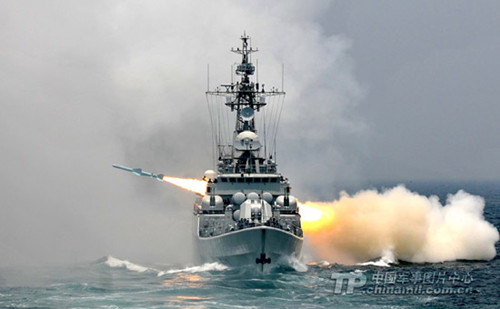
A maritime garrison under the East China Sea Fleet of the Navy of the Chinese People's Liberation Army (PLA) organized maritime maneuvering and missile-firing drill on September 14, 2012, in a bid to temper the combat capability of the troops in complex
Chinese naval fleets have recently passed through the international waters between Okinawa and Miyako and headed for the Pacific for an ocean-going exercise, which triggered speculations of Japanese media and politicians. Actually, every time the Chinese navy carries out the ocean-going exercise, the Japanese side will make a fuss. It is thought-provoking why Japan is so vigilant against the legitimate training and maritime activities of the Chinese navy.
As China has vast territorial waters, it is an objective requirement of safeguarding national maritime security to strengthen naval construction and carry out blue sea trainings. In 1986, Chinese navy sent fleets to the waters of Pacific Northwest for joint combat training. In recent years, Chinese warships have been patrolling and escorting ships in Gulf of Aden off the waters of Somalia. The blue water training has become routine training course of Chinese navy.
The Miyako Strait and Osumi Strait are the only routes for the Chinese navy to head for the Western Pacific, and it is in line with the United Nations Convention on the Law of the Sea and other international laws for the Chinese navy to pass through the Miyako-Osumi Strait. Therefore, the Japanese side has no reasons to stir up troubles.
Japan accused China of violating the "crisis management mechanism" and not notifying Japanese side in advance. In fact, the "crisis management mechanism" has not been established between Chinese and Japanese defense departments and the so-called "consensus" that Chinese fleets should notify the Japanese side before passing through the straits nearby Japan does not exist. In terms of both international laws and bilateral relations, China has the right to sail freely in relevant waters and bears no responsibility of notification in advance.
What deserves attention is that Japan frequently dispatches military naval vessels to track and monitor the blue sea trainings of China at short range, interfering with the regular sailing of Chinese fleets. It can easily lead to maritime and air security incidents, which damage bilateral mutual trust and regional peace and stability.
China adheres to the path of peaceful development and Chinese army is a staunch force of safeguarding the global peace. The Chinese navy will deepen security cooperation with other countries to better fulfill its international obligations. Chinese warships will pass through more international straits and waters in the future to carry out blue sea trainings. If some people still make a fuss about the regular blue sea training of China, they need to adjust their mind to treat it rationally.

Copyright ©1999-2011 Chinanews.com. All rights reserved.
Reproduction in whole or in part without permission is prohibited.